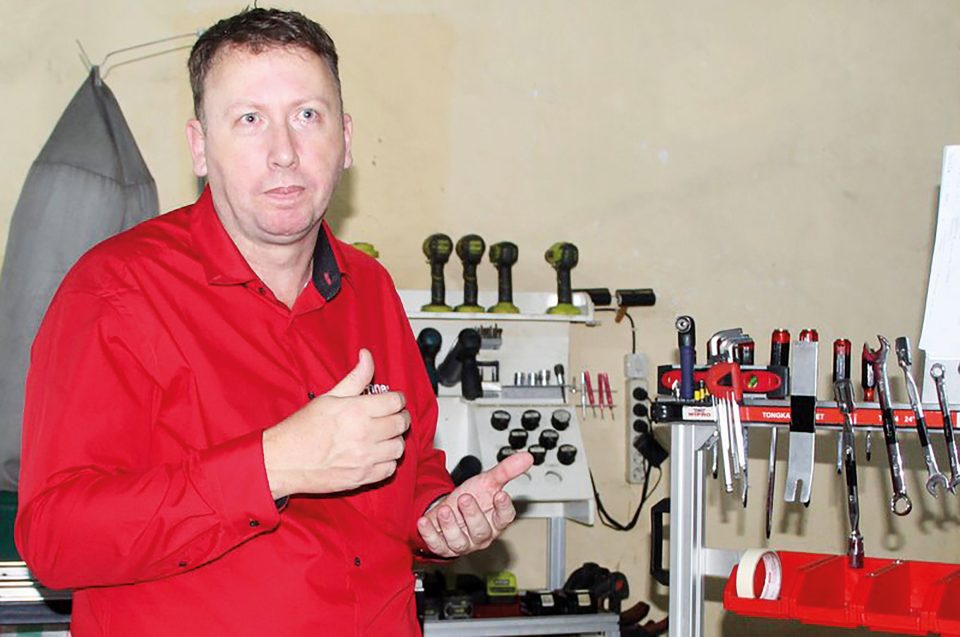Frank Sinatra crooned that love and marriage go together like a horse and carriage, but work and pleasure don’t rhyme for most people.
An exception is Kiwi inventor Paul Dixon and his company Environeer.
“If business is fun, we’d get more done and enjoy coming to work,” he said. “In that way everyone benefits. It’s what makes you happy at the end of the day.”
It sounds like the stuff that comes from gurus wearing kaftans and beads, but Dixon is a serious, dirt-under-fingernails entrepreneur even if his methods are a mite unusual. Clients entering the New Zealander’s Surabaya showroom don’t get the traditional greeting – “please take a seat.” That’s because there aren’t any.
Instead, visitors are invited to stand and discuss their needs around a waist-high table. Another difficulty: it’s too small to share papers and a bag. No worries, there are hooks underneath.
The room has an array of Environeer’s assembly systems, like belt and roller conveyors built for industrial needs; the walls are covered with posters featuring the company’s designs, so the absence of chairs doesn’t suggest a cash-flow problem.
For guidance guests need to check a small notice listing “seven benefits of a standing desk,” also known as an “active workstation.” Most relate to mental and physical wellbeing, such as lowering blood sugar and trimming waistlines.
The idea doesn’t stop at the door. Inside the workshop are lathes, metal guillotines, pipe benders, and a furnace to melt aluminium waste and cast the molten metal into new shapes. There are also small workbenches on wheels.
In Australia and NZ, tradesmen, or “tradies” in local vernacular, look like gunslingers from an old Western movie; electric drills in holsters and belts of screwdrivers in place of ammunition.
“This way of working doesn’t suit Indonesians,” said Dixon. “So we’ve built moveable benches which can be pulled around the factory. There’s no time wasted moving to and from a static workbench and wondering where you’ve left the hammer. The key thing is simplicity.”
He’s a fan of US businessman Paul Akers, who promotes waste minimisation processes known as “lean thinking,” and used in Toyota’s car production lines. Dixon is in his early 40s, so too young to be labelled eccentric. Unconventional is a better fit.
He grew up in the centre of NZ’s North Island where his father was an academic, though also keen on woodwork. Instead of playing with bought toys, the wee lad mucked around with the off-cuts in his dad’s garage. When he was four, his parents gave him an old cash register which he pulled apart, “just to see how it works. If you don’t know how something is put together, how can you fix it?”
The downside of being blessed with curiosity is being cursed by boredom. This has turned many Kiwis into DIY (Do It Yourself) experts who are able to fix things without waiting for spares from overseas. It’s called the Number Eight Wire attitude. The real thing is a standard, four-millimetre wire used in farm fencing, but also serves as a metaphor for Godzone resourcefulness.
Part joke and rural myth about fixing broken machinery, the term’s supposed to represent the ingenuity that keeps a country of only 4.5 million people at the vanguard of international innovation. NZ has produced three Nobel laureates, including Ernest Rutherford (1871-1937), labelled “the father of nuclear physics,” and the greatest experimentalist of his age.
Dixon thinks the quality isn’t exclusive to his geographically-isolated homeland. “South Africans have it too,” he said. “They were separated last century by the anti-apartheid sanctions so couldn’t get new parts.”
After graduating from university with a degree in material science, Dixon took on any task he could find. A spell cutting drill cores for miners led to a move across the Tasman and to work in the West Australian northwest town of Port Hedland, then at the height of the iron-ore boom.
He stayed for about ten years, mainly specialising in equipment to suppress the ochre dust which smothers buildings and trucks across the ore-rich Pilbara region. At the time, big company employees worked up to three weeks straight and then took a week off. Most flew to the state capital Perth, 1,600 kilometres to the southwest, to catch up with families.
Dixon, a single man, headed to Denpasar, 300 kilometres closer. Instead of lounging poolside in Kuta, he abandoned the tourist strips to see how people were living and working, trying to understand how Indonesians think.
He soon discovered that while Bali is rich in culture, most of the gear used in workshops and building sites came from Surabaya. So next stop was the East Java capital to do the same thing again – wander, observe, ask, and noticing opportunities where others only saw difficulties.
“I understood little about Indonesia and couldn’t speak the language,” said Dixon. “I didn’t have a fistful of name cards and knew no-one. I didn’t ask the Embassy or trade commissioners for advice. I had no local partners or management consultants. That’s not my style. I learn as I go along and just let things evolve.”
Which they did. Stuck in an airport by a flight delay, he struck up a conversation with Hanna Agustine who was dissatisfied with her job in an Indonesian company so agreed to help him rent some space and get started.
Now she’s the business development manager of a company that stresses safety so designs and builds guards around machinery, particularly assembly-line gear.
Environeer is certified by the ISO (International Organization for Standardization). It has a workforce of about 50 and no debts. “I’m like the Chinese,” Dixon said. “I keep away from banks and put all our earnings back into the factory.”
Could other expats follow the same path? “It’s all about attitude. We do things in a slightly different way. Not everything is about making money. We can learn so much from different cultures.”




